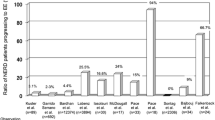Abstract
The reflux oesophagitis treatment aims to achieve a rapid and sustained symptom relief and a high percentage of lesion healing, apart from preventing the relapses and complications of the disease. For that purpose it is essential to maintain the oesophagic pH above 4 for as long as possible during the day and the night. All these objectives are achieved with the use of the proton pump inhibitors (PPI), which constitute the most effective drug group — being superior to the rest of the antisecretory drugs, such as anti-H2, which are no longer in use in this treatment.
In moderate grades (grades A and B), all the PPIs used at their usual dosages show a similar treatment efficacy within 8 weeks. In severe cases (grades C and D), as well as those complicated with digestive haemorrhagia or Barrett’s oesophagus, esomeprazole shows a higher treatment efficacy than the rest of the PPIs and is therefore the drug of choice. Furthermore, esomeprazole, an active isomer of omeprazole, shows other properties such as a higher rate of action, a lower interindividual variation and a more prolonged mode of action, which all translate into additional advantages in comparison with the rest of the PPIs.





Similar content being viewed by others
References
Vaezi MF, Richter JE. Role of acid and duodenogastroe-sophageal reflux in gastroesophageal reflux disease. Gas-troenterology 1996; 111: 1192–9
Campos GM, Peters JH, Demeester TR, et al. The pattern of esophageal acid exposure in gastroesophageal reflux disease influences the severity of the disease. Arch Surg 1999; 134: 882–7
Lundell LR, Dent J, Bennett JR, et al. Endoscopic assessment of oesophagitis: clinical and functional correlates and further validation of the Los Angeles classification. Gut 1999; 45: 172–80
Hunt RH. The relationship between the control of pH and healing and symptom relief in gastrooesophageal reflux disease. Aliment Pharmacol Ther 1995; 9 Suppl 1: 3–7
Klinkenberg-Knol EC, Nelis F, Dent J, et al. Long-term omeprazole treatment in resistant gastroesophageal reflux disease: efficacy, safety and influence on gastric mucosa. Gastroenterology 2000; 118: 661–9
Palmer RH, Frank WO, Rockhold FW, et al. Cimetidine 800 mg twice daily for healing erosions and ulcers in gastroesophageal reflux disease. J Clin Gastroenterol 1990; 12 Suppl 2: 29-S34
Simon TJ, Berenson MM, Berlin RG, Snapin S, Cagliola A. Randomized placebo-controlled comparison of famotidine 20 mg b.i.d. in patients with erosive oesophagitis. Aliment Pharmacol Ther 1994; 8: 71–9
Sharma VK, Leontiadis GI, Howden CW. Meta-analysis of randomised controlled trials comparing standard clinical doses of omeprazole and lansoprazole in erosive esophagitis. Aliment Pharmacol Ther 2001; 15: 227–31
Chiba N, De Gara CJ, Wilkinson JM, et al. Speed of healing and symptom relief in grade II to IV gastroesophageal reflux disease: a meta-analysis. Gastroenterology 1997; 112: 1798–810
Vakil N, Fennerty MB. Direct comparative trials of the efficacy of proton pump inhibitors in the management of gastro-oesophageal reflux disease and peptic ulcer disease. Aliment Pharmacol Ther 2003; 18: 559–68
Edwards S, Lind T, Lundell L. Systematic review of proton pump inhibitors for the acute treatment of reflux oesophagitis. Aliment Pharmacol Ther 2001; 15: 1729–36
Robinson M, Fitzgerald S, Hegedus R, et al. Fast trial investigators. Onset of symptom relief with rabeprazole: a community based, open-label assessment of patients with erosive oesophagitis. Aliment Pharmacol Ther 2002; 16: 445–54
Lind T, Rydberg L, Kylebäck A, et al. Esomeprazol provides improved acid control vs. omeprazole in patients with symptoms of gastro-oesophageal reflux disease. Aliment Pharmacol Ther 2000; 14: 861–7
Castell DO, Kahrilas PJ, Richter JE, et al. Esomeprazol (40 mg) compared with lansoprazole (30 mg) in the treatment of erosive esophagitis. Am J Gastroenterol 2002; 97: 575–83
Kahrilas PJ, Falk GW, Johnson DA, et al. Esomeprazol improves healing and symptom resolution as compared with omeprazole in reflux oesophagitis patients: a randomised controlled trial. Aliment Pharmacol Ther 2000; 14: 1.249-58
Richter JE, Kahrilas PJ, Johanson J, et al. Efficacy and safety of esomeprazol compared with omeprazole in GERD patients with erosive esophagitis: a randomized controlled trial. Am J Gastroenterol 2001; 96: 656–65
Roach AC, Hwang V, Bjorkman DJ. Evidence-based analysis of the benefit of esomeprazol in the treatment of erosive esophagitis (EE). Gut 2001; 49 Suppl III: A–2755
Vakil NB, Richter JE, Hwang C, et al. Does baseline severity of EE impact healing with esomeprazol? Am J Gastroenterol 2000; 95: 2439
Bate CM, Booth SN, Crowe JP, et al. Does 40 mg omeprazole daily offer additional benefit over 20 mg daily in patients requiring more than 4 weeks of treatment for symptomatic reflux oesophagitis?. Aliment Pharmacol Ther 1993; 7: 501–7
Mulder CJ, Dekker W, Gerretsen M. Lansoprazole 30 mg versus omeprazole 40 mg in the treatment of reflux oesophagitis grade II, III and IVa (a Dutch multicentre trial). Dutch Study Group. Eur J Gastroenterol Hepatol 1996; 8: 1101–6
Miner P Jr, Katz PO, Chen Y, Sostek M. Gastric acid control with esomeprazol, lansoprazole, omeprazole, pantoprazole and rabeprazole: a five-way crossover study. Am J Gastroenterol 2003; 98: 2616–20
Bell NJ, Burget D, Howden CW, Wilkinson J, Hunt RH. Appropriate acid suppression for the management of gastro-oesophageal reflux disease. Digestion 1992; 51 Suppl 1: 59–67
Author information
Authors and Affiliations
Corresponding author
Rights and permissions
About this article
Cite this article
Rodrigo, L. Healing of Oesophagitis. Drugs 65 (Suppl 1), 51–57 (2005). https://doi.org/10.2165/00003495-200565001-00008
Published:
Issue Date:
DOI: https://doi.org/10.2165/00003495-200565001-00008




